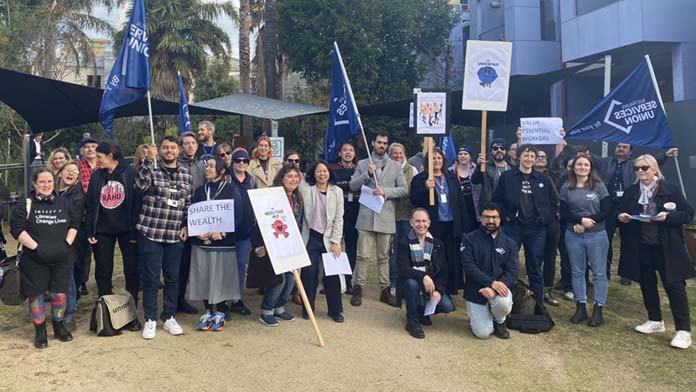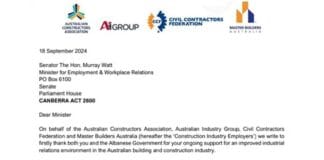Workers at the Brotherhood of St Laurence (BSL) in Melbourne have rejected management’s proposed enterprise agreement in a non-union ballot, 61 per cent to 39 per cent.
The outcome is a testament to grassroots organising, with union members convincing colleagues that the money exists for pay rises that keep up with the cost of living.
The agreement included pay rises of 5 per cent this year, 4 per cent in 2024 and 3 per cent in 2025 plus improvements to cultural and parental leave.
But with inflation well above this, and management refusing to deliver other leave entitlements, Australian Services Union (ASU) members ran a strong No campaign.
It was a win for solidarity over division. In information sessions held to sell the agreement HR suggested that the union should accept smaller wage rises in return for reproductive leave, gender affirmation leave and additional leave entitlements for First Nations staff, conditions the union has been campaigning for.
Workers refused to be blackmailed. Workers shouldn’t have to accept a real pay cut in return for other rights.
Unprecedented
The day after the ballot results were announced union members held a four-hour strike and protest at a meeting of the BSL Board. Staff read out messages sent by union members who couldn’t physically attend.
They then marched to the Board meeting, chanting “we need more pay in our EBA”. Placards read “BSL staff need reproductive leave”, “Respect our voice—more leave for First Nations staff”, and “Gender affirmation leave now”.
This is the first time in memory that BSL staff have rejected an enterprise agreement and the first time that staff have struck and protested at the Board.
The agreement covers about 1100 staff working across NDIS, aged care, early childhood, migrant services, financial education, research and admin.
Like much of the community sector, about 80 per cent of BSL staff are female. Unpaid overtime is rife.
There is a culture in social and community services (SACS) of workers sacrificing their own well-being for the sake of vulnerable clients. SACS workers often perform “caring work” associated with women’s unpaid labour in the home and volunteer work.
This has led to the gendered undervaluation of SACS workers, which was acknowledged by Fair Work Australia in the equal pay case of 2012 when unions, led by the ASU, won pay rises of between 19 and 41 per cent.
Those hard-fought gains are now being undermined by inflation. BSL workers have suffered two and a half years of below-inflation pay rises.
Building the union
More than 100 workers have joined the union since negotiations began. The union’s strength is based on a strong network of rank-and-file delegates and activists. Regular union meetings provide a space to discuss issues and plan actions.
BSL workers are spread across dozens of sites, so these meetings are hybrid, held online and in-person with members gathering at offices.
During protected industrial action these have become stop work meetings. In these meetings members heard about each others’ struggles with the cost of living, and from First Nations and trans staff about why more leave entitlements are important to them.
The successful No vote was just as much about fighting for the rights of women, First Nations and gender diverse workers as it was about pay.
And the stop work meetings are a space for members to discuss how to escalate industrial action.
This rank-and-file organisation laid the basis for the successful No vote. ASU officials leafletted sites where membership was weak.
Following the No vote and strike action BSL has made concessions. They have agreed to four weeks’ paid gender affirmation leave and look like they will agree to additional leave for First Nations staff.
But the organisation has not committed to improving the wage offer. Union members will need to turn up the pressure to guarantee these entitlements and real wage rises.
In coming weeks workers will write union messages on office windows and company cars using liquid chalk markers.
Union activists are taking every opportunity to mobilise members and campaign at public BSL events.
In late June BSL had an expo at State Parliament to promote its programs among MPs, public servants and other VIPs. Union members at the expo wore campaign badges and handed out leaflets.
There will be another strike and protest at the next BSL Board meeting and a protest at the BSL Sambell Oration on 11 July where Federal Treasurer Jim Chalmers will, according to the website, “Address our current economic challenges and the impact these are having on people living in poverty.”
Ending poverty should start with real pay rises for workers. Escalating industrial action is the way to win it.
By an ASU member






